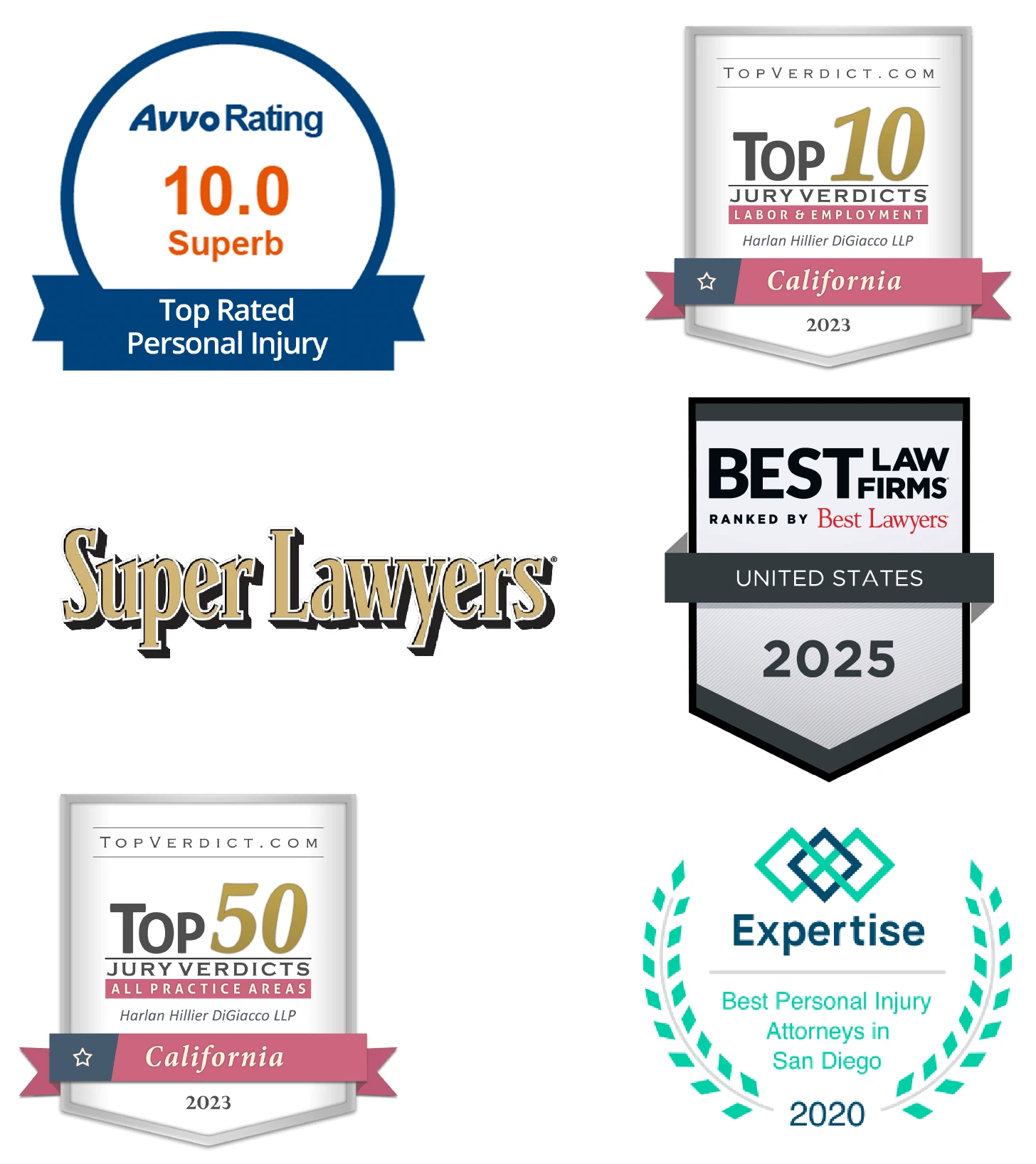PRACTICE AREA
California FMLA & CFRA Attorney
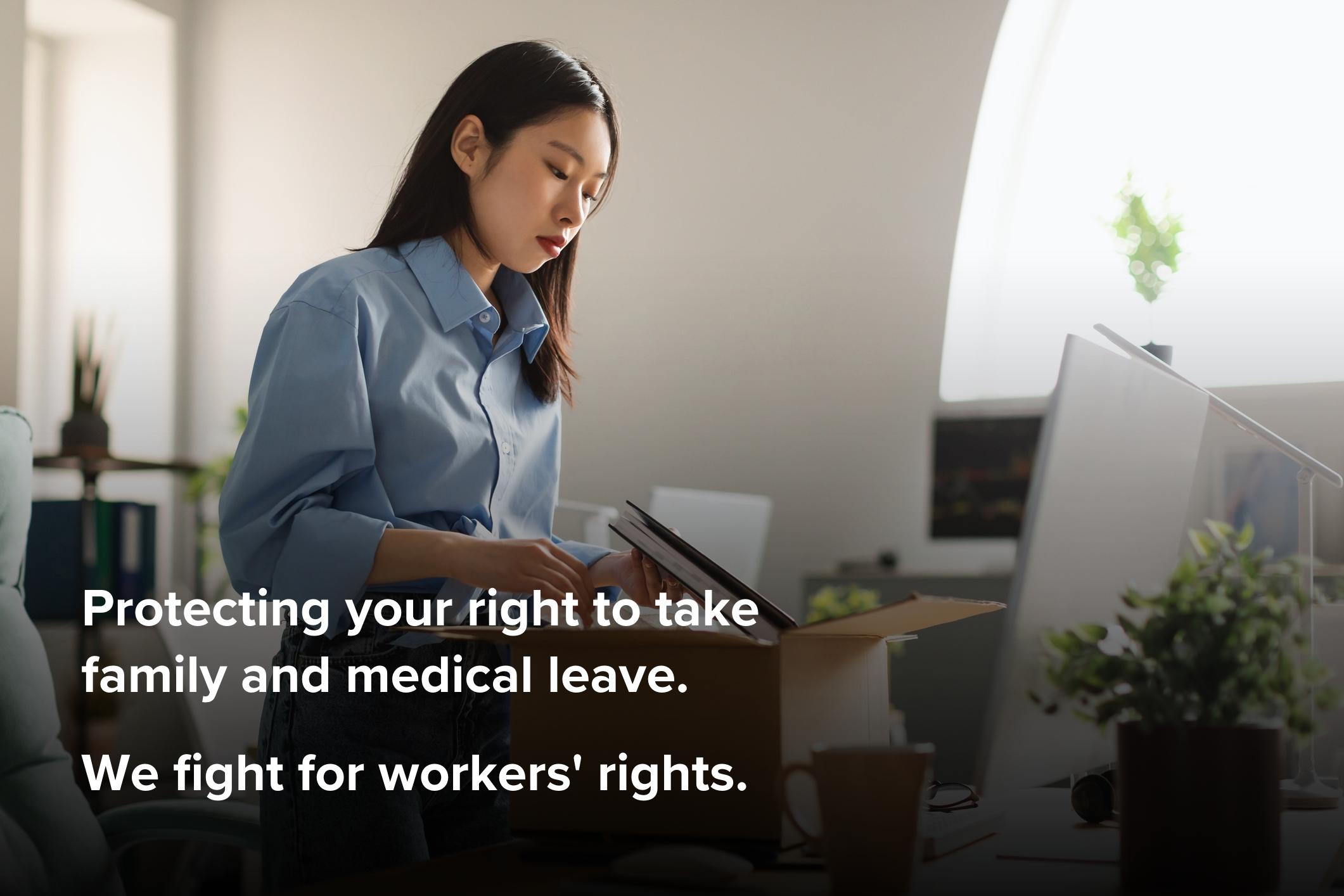
Life doesn’t always go as planned. A sudden illness, an injury, or a new baby can turn everything upside down. In those moments, the last thing you should have to worry about is whether taking time off to care for yourself or your family will cost you your job.
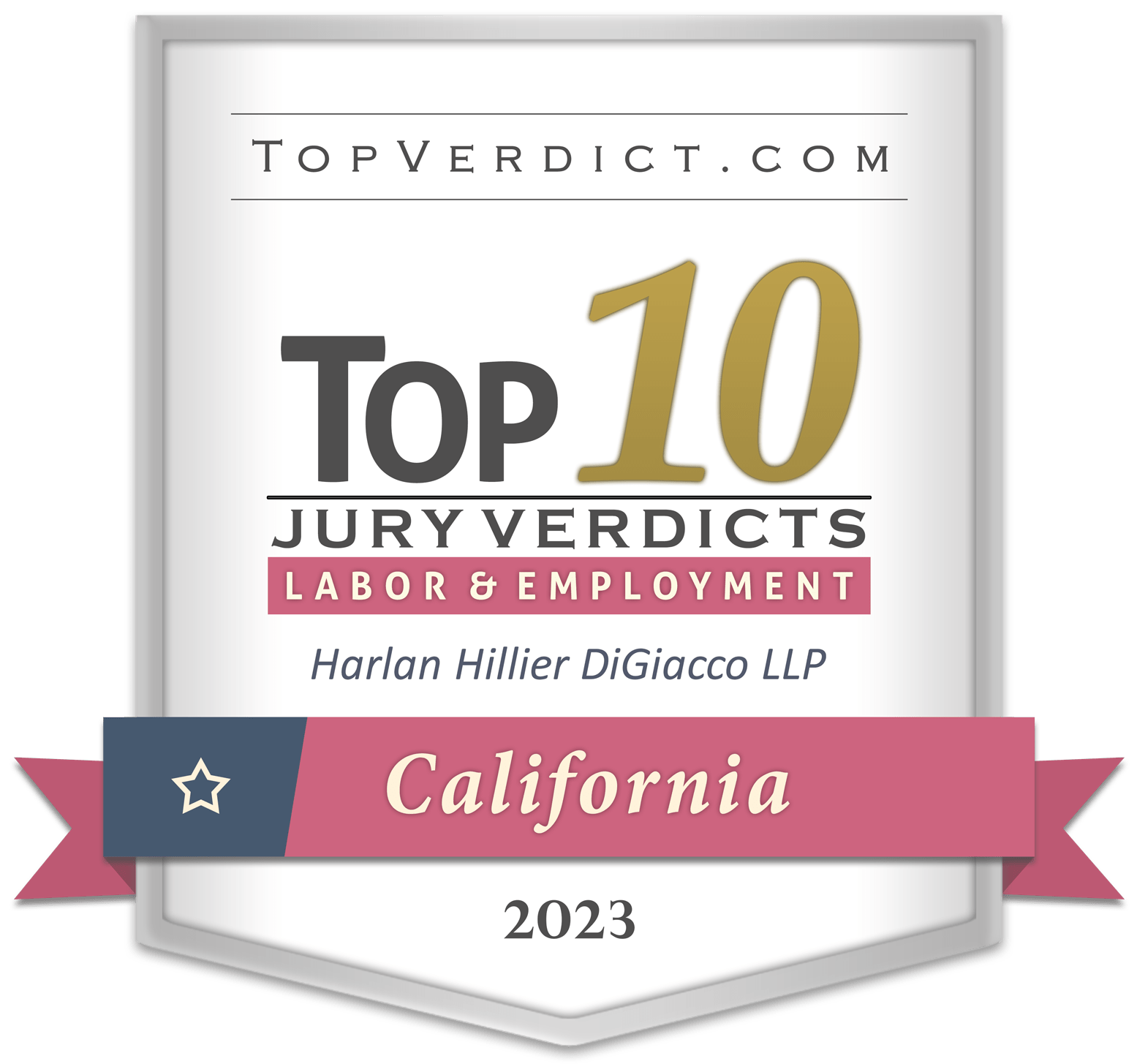
Thankfully, both California and federal laws give workers the right to take time off for family or medical reasons without losing their employment. These laws are meant to protect your job and give you the breathing room you need during some of life’s most important and difficult moments. In fact, California has some of the most robust employee protections in the country.
Unfortunately, not every employer plays by the rules. Some try to deny employees the leave they’re legally entitled to. Others may retaliate when workers take protected time off.
At Harlan Hillier DiGiacco, our San Diego-based employment law firm helps California workers whose rights under laws like the Family and Medical Leave Act (FMLA) and the California Family Rights Act (CFRA) have been violated. Whether you were denied leave, fired for using it, or discriminated against when you returned, a California FMLA lawyer can help you protect your job and your future.
You and workers across California deserve better; call Harlan Hillier DiGiacco at (619) 330-5120 or fill out our quick online form today to schedule a no-cost case review.
“Harlan Hillier DiGiacco is one of the most honest law firms in San Diego. I was recently put in a tough situation last year by an employer, and had no choice but to look for legal representation. I called numerous law firms, but no one seemed as understanding and empathetic as Jordon Harlan. From the moment I spoke to him, he advised me and guided me in the best way possible through my case. It was extremely easy working with him because I never had to worry about anything, and he always kept me up to date without having to ask. He goes above and beyond for his clients, and that is something that is hard to find. Thank you Jordon!”
– Philip F. | Client
Federal Rights Under the Family and Medical Leave Act (FMLA)
Imagine taking time off to care for your family’s health, only to find out while you’re gone that you’ve been demoted or fired from your job.
The Family and Medical Leave Act (FMLA) helps employees handle family and medical issues without having to sacrifice their jobs. The law applies to all 50 states and grants employees up to 12 weeks of protected, unpaid time off.
When you take FMLA leave, you must have a job available when you return to work. Although it doesn’t have to be the exact same job you had before, your position when you return must be similar and equivalent to the one you previously held, in both pay and job duties.
To be covered under the FMLA, you must be classified as a qualifying employee who works for a qualifying employer. If you suspect you’re a qualifying employee but your employer has classified you otherwise, you may be misclassified, which is also illegal.
FMLA in California
Even though it’s a nationwide law, FMLA works a little differently when you live or work in California, mostly because California has its own additional laws that often go further than the FMLA. But even with stronger laws in place, many workers here still struggle to get their legally protected time off.
If you’re in California and you’re unsure whether your employer has to follow the FMLA, the key is to focus on whether they meet the size and distance requirements, and whether you meet the work history and hours thresholds. If you do, your leave is protected by law, no matter what your employer tells you.
Who Is Covered Under the FMLA?
The FMLA applies to your employer if you work for:
- Any public or private elementary or secondary school,
- Any local, state, or federal government agency, or
- A private employer with 50+ employees located within 75 miles.
To qualify for FMLA as an employee, you must:
- Work for an employer who qualifies under the FMLA,
- Have worked for the same employer for at least 12 months and 1,250 hours within the last 7 years (consecutive or not), and
- Work within 75 miles of a worksite with 50 employees or more.
Although it’s not required under the FMLA, your employer is allowed to ask for proof of a serious illness before granting you leave time.
We’ve Taken on FMLA and CFRA Violations Before and Won
At Harlan Hillier DiGiacco, we’ve stood up for employees whose rights under the FMLA and CFRA were ignored, and we’ve won. When 69-year-old occupational therapist Marilyn Buron was wrongfully terminated while on family leave to care for her seriously ill son, our firm took her case to trial and secured a $9.3 million verdict. Her story is a powerful example of what can happen when employers treat workers as numbers on payroll instead of respecting their legal rights and their humanity. Watch the video to see how we helped Marilyn get justice.
How Much Leave Time Can You Take Under the FMLA?
The FMLA allows a total of up to 12 weeks of unpaid leave within a 12-month period for serious medical conditions such as childbirth, illness, injury, or disability. You can also use FMLA leave to care for others in your immediate family. In-laws are not covered.
You must take your leave within 12 months of a qualifying condition, such as:
- Childbirth and other pregnancy-related conditions
- Caring for a newborn under the age of 1
- Caring for a foster or adopted child within a year of placement
- Attending to a spouse, child, or parent with a serious medical condition
- Caring for your own health when you have a serious medical condition that makes it impossible for you to work
- Family care when a military family member is on active duty
You can take a total of 26 weeks of unpaid leave when caring for an injured or sick military member who is your spouse, child, parent, or next of kin under your custody.
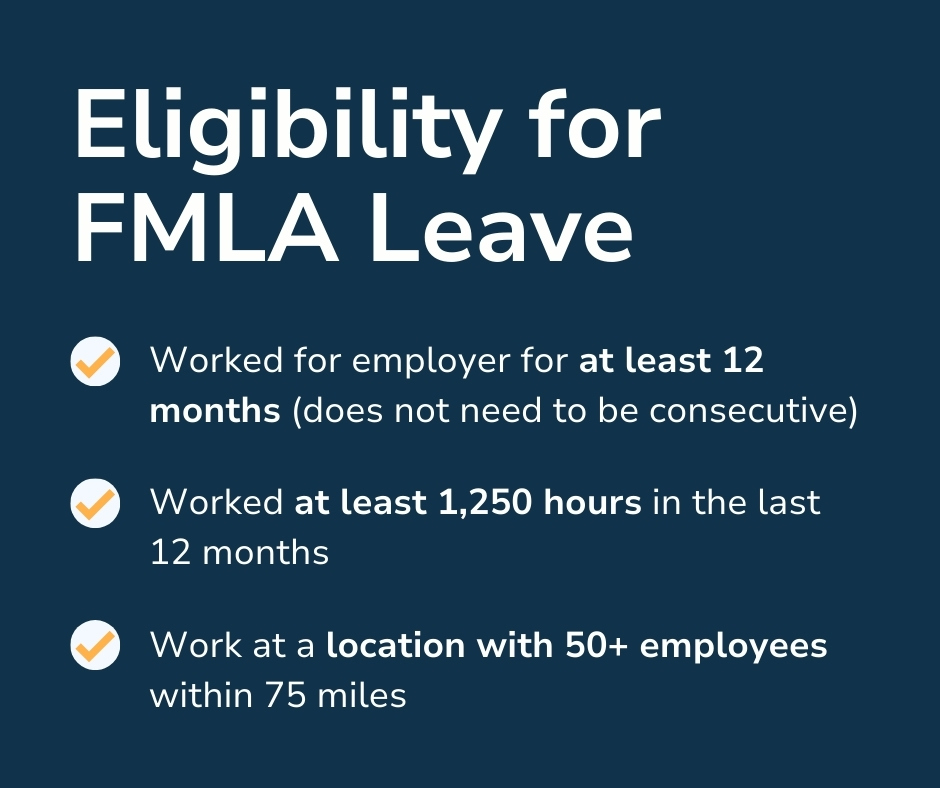
What Is Considered a Serious Medical Condition Under the FMLA?
The FMLA considers a serious medical condition to be an injury, illness, disability, or physical or mental impairment that has one or more of the following effects:
- Pregnancy and prenatal care
- Bonding with a newborn child after the birth
- Becoming incapacitated physically or mentally
- Staying overnight in a hospital, hospice, or another medical facility
- Chronic health conditions requiring periodic care, such as diabetes, asthma, or epilepsy
- Untreatable health conditions such as terminal illness, Alzheimer’s, or stroke
- Required time off for at least 3 days for treatments or recovery
The above list includes medical care as a result of organ donation or domestic violence, both of which may include extended hospital stays.
To establish a serious medical condition, you must show:
- A doctor’s visit within 7 days of symptoms to establish a diagnosis,
- At least 2 separate visits to a doctor within a 30-day period,
- The second visit is deemed “necessary” by the doctor, and
- More than 3 days of absence are required because of the condition.
If you meet these factors, your employer must grant you FMLA leave under the law. If they don’t, you can take legal action against your employer.
What Is Intermittent FMLA?
What if your family member’s condition allows you to continue working, just not full-time?
You don’t have to take all your FMLA leave at once. Instead, you can:
- Take leave in separate blocks of time, even if the underlying reason is the same, or
- Take leave through a reduced work schedule, either daily or weekly.
Intermittent leave allows you to continue earning a paycheck while caring for your family. With this flexible approach, you can lessen your workload without leaving your job completely.
If you take intermittent leave, you must make an effort to work with your employer’s schedule. During your leave, your employer is allowed to temporarily transfer you to another position if it suits your alternate schedule better than your original job.
No one should be punished for putting their family first. When you take protected leave, you’re not asking for a favor; you’re exercising a legal right. Yet, too many workers find out the hard way that their employer sees them as disposable the moment they need time to care for themselves or a loved one.
At Harlan Hillier DiGiacco, we fight for California employees who deserve to be treated like people, not just workers. From workplace harassment to unpaid wages, our team has supported workers through every type of employment injustice. Fill out our quick online form or call (619) 330-5120 to chat with our team and find out more about how a California CFRA attorney from our firm will stand up to your employer.
California Family Rights Act
California employees are covered by both the FMLA and the California Family Rights Act (CFRA). However, the CFRA has slightly different rules from the FMLA.
Under the FMLA, you can take time to attend to a service member who is a spouse, child, parent, or next of kin. The CFRA covers only your spouse, children, and parents.
While pregnancy is a “serious medical condition” under the FMLA, the CFRA doesn’t cover pregnancy by itself. Instead, you could take up to 4 months of leave with California’s Pregnancy Disability Leave.
The FMLA allows you to take protective leave if a family member goes on active military duty, but the CFRA doesn’t cover this condition. Instead, California allows leave for military families under the Military Family Leave Act.
The FMLA does not consider domestic partners as “spouses” even if they’re registered. The CFRA does. This extends rights to many unmarried cohabiting couples.
Effective January 1, 2021, the CFRA applies to any private employers with 5 employees or more and all public employers. In addition, the CFRA no longer requires employees to work within 75 miles of a worksite. As a result of these changes, many more employees are covered moving forward under the CFRA than under the FMLA.
Recent changes to the CFRA also extended the California state law’s definition of “family members.” Starting in 2021, the new definition covers all children (not just minors and dependents), your spouse, parents, as well as siblings, grandparents, grandchildren, and domestic partners. As a result, California employees can get the benefit of leave to take care of a much wider circle of family members.
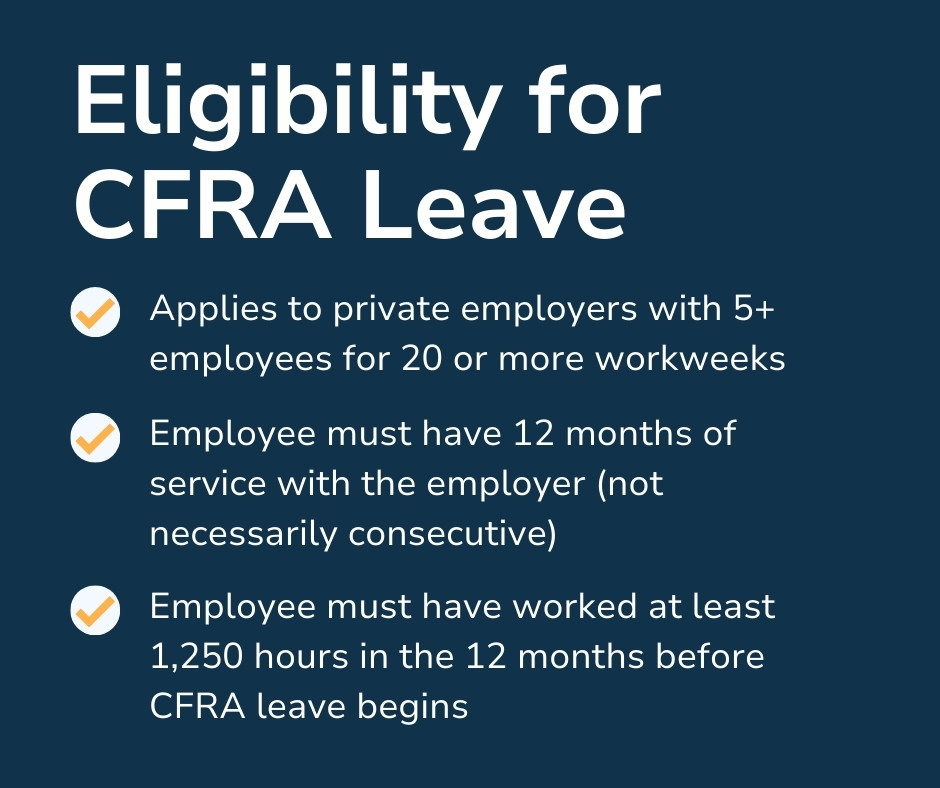
Additional California Employment Leave Laws You Should Know About
In addition to the CFRA, California has a number of other statutes and laws that allow for varying levels of employee leave, including:
- California Paid Temporary Disability Insurance
- The California New Parent Leave Act (NPLA)
- The California Small Necessities Act
The California Labor Code also offers leave for:
- Organ or bone marrow donors
- Victims of domestic violence, sexual assault, or stalking
- Family crises, such as divorce, counseling, conflict resolution, or emergencies
The options can be overwhelming, so it’s best to speak with a California FMLA attorney who can help you better understand the particulars of state and federal leave.
Most of the leave available to employees is unpaid, which can cause additional economic stress for those who need to take time off. Fortunately, California has a program that offers paid family leave to employees who qualify.
CFRA vs FMLA
In California, many workers are protected by both the FMLA and CRFA. While the two laws seem similar and often overlap, there are important differences that can affect how much leave you get, who you can care for, and whether you qualify.
Here are the main differences to consider:
- FMLA only allows leave to care for a spouse, a parent, or a child who is a minor or a dependent adult. It does not include domestic partners, in-laws, siblings, or grandparents.
- CFRA allows leave to care for a much wider group of family members, including a spouse or registered domestic partner, a parent, a child of any age, siblings, grandparents, grandchildren, and parents-in-law.
- FMLA includes pregnancy, childbirth, and prenatal care as valid reasons to take protected leave.
- CFRA does not cover pregnancy by itself, but California provides separate Pregnancy Disability Leave (PDL), which can be taken before CFRA leave begins. Many pregnant employees in California are able to combine PDL and CFRA for a longer period of protected time off.
- FMLA provides special leave for situations involving a family member’s active duty deployment or to care for a seriously injured or ill military service member.
- CFRA does not offer military-related leave, but California has other state laws that provide separate protections for military families.
- FMLA only applies if your employer has 50 or more employees within 75 miles.
- CFRA applies to any employer with 5 or more employees, no matter the location. This means many small business employees in California are covered under CFRA but not FMLA.
If you’re still confused whether your employer crossed the line and violated your rights, don’t second-guess yourself or suffer in silence. You deserve answers, and more importantly, you deserve justice.
At Harlan Hillier DiGiacco, we help employees across California get clarity, support, and results when their livelihoods are on the line. Let’s talk about your rights as an employee today. Connect with a California FMLA lawyer by filing out our online form or calling (619) 330-5120.
California Paid Family Leave (PFL) Benefits
California’s Paid Family Leave (PFL) program provides payments but not job protection to employees taking care of a child, spouse, domestic partner, parent, in-law, grandparent, grandchild, or sibling with a serious medical condition.
If you qualify for PFL relief, depending on your income, the benefits you receive may cover 50% or more of your wages for up to 8 weeks within a 12-month period. Since most government-protected leave is unpaid, this additional income could make a big difference for your family while you take time off work to care for them.
To qualify for paid family leave benefits under the PFL program, you must:
- Be employed or actively looking for work at the time you need leave,
- Be unable to work because you’re attending to a family member with a serious medical condition or bonding with a new child, and
- Have lost wages due to caring for your family.
You must complete your PFL application within 41 days of your family leave starting. You will also have to provide a medical certificate confirming the illness.
The laws around paid and unpaid family and medical leave can be confusing, especially when it comes to how these laws interact with each other. Your best option for protecting your legal rights as an employee is to talk to an employment lawyer about your unique situation.
Protect Your Rights to Family and Medical Leave With a California FMLA Attorney
Employment issues can be complex, with your career and livelihood at stake. Usually, they’re the last thing you want to think about when your family is ill or injured. You have the legal right to care for your family without worrying about derailing your career.
Federal and California state laws allow employees to take protected leave, which means you can expect your job to be waiting for you when you return. You might even be eligible for additional benefits under the law, like leave payments for the paychecks that you miss.
If your employer is challenging your right to protected leave or punishing you for taking time off to care for your family, you can bring legal action against them for misconduct.
Our attorneys will help you identify potential violations, including:
- Denying or refusing to authorize your request for FMLA or CFRA leave, even when you meet all the legal requirements.
- Firing, demoting, or disciplining you because you took protected family or medical leave.
- Cutting your hours or pay after you return from leave.
- Reinstating you to a different position that is not equivalent in pay, benefits, or job duties.
- Terminating you while you are on approved leave, without legitimate business justification.
- Failing to maintain your group health insurance benefits while you are on leave.
- Retaliating against you for requesting or inquiring about your rights under FMLA or CFRA.
- Requiring you to work or respond to emails and calls while on protected leave.
A Martindale-Nolo study found that those with lawyers received over four times more in compensation, even after fees. When your job and future are on the line, don’t go it alone.
How Much Does It Cost to Work With a California Family Rights Act Attorney?
Most employees don’t want to fight their employers and put their jobs at risk. Many people don’t have nearly the same resources and money as the companies they work for, which is why at Harlan Hillier DiGiacco, we take our employment cases on a contingency fee basis.
Contingency fee billing means no up-front costs for you. You don’t pay us until we recover what your employer owes you under the law. You don’t have to worry about how you can afford a lawyer, instead, you can focus on you and your family’s health and well-being.
Why Hire Harlan Hillier DiGiacco
At Harlan Hillier DiGiacco, we understand that behind every case is a real person trying to hold their life together. You are not just another file on a desk. Our firm does not take a one-size-fits-all approach, and we do not treat clients like numbers.
We listen to your story, the details that others may overlook, and the emotional weight you are carrying. Then we tailor a legal strategy built around your needs, your goals, and your future.
At Harlan Hillier DiGiacco, we fight for employees. Call our California employment law firm now at (619) 330-5120 or fill out our online form for a free consultation of your case.
Proudly Representing California Residents
California FMLA & CFRA Lawsuit FAQs
What Are the Deadlines for Filing an FMLA or CFRA Claim?
In California, you generally have two years to file a lawsuit if your FMLA or CFRA rights were violated. If the violation is considered willful, the deadline extends to three years. Before filing a lawsuit, you must first submit your claim to the Wage and Hour Division of the U.S. Department of Labor (DOL) for FMLA violations. If the DOL cannot resolve the issue, you have 90 days to file a lawsuit in court.
Is My Employer Required to Pay Me During FMLA or CFRA Leave?
No, employers are not required to pay you during FMLA or CFRA leave. However, if you have accrued paid time off, sick days, or vacation time, your employer must allow you to use that paid leave while you are out. You also may qualify for wage replacement benefits under California’s State Disability Insurance (SDI) or Paid Family Leave (PFL) programs.
What Damages Can I Collect If My Employer Violated FMLA or CFRA?
If you successfully prove your employer violated the FMLA or CFRA, you may be entitled to several types of damages. These include lost wages for any time you were unfairly terminated due to taking leave, liquidated damages, which could equal your lost wages award in FMLA cases, and attorney’s fees, which can be recovered in CFRA and other leave-related cases.
Can You Be Fired While On FMLA or CRFA Leave?
In California, employers are generally prohibited from firing employees who take leave under the FMLA, CFRA, or similar laws. However, there are exceptions. For example, employees on invalid leave, those affected by company-wide layoffs, or “key employees” (the highest-paid 10% of workers) may face job restoration denial if their return causes significant hardship to the employer.
About Harlan Hillier DiGiacco
Our San Diego law firm is dedicated to providing the best advocacy possible for clients nationwide. Call our experienced personal injury and employment lawyers today at (619) 330-5120 for your first free consultation.

